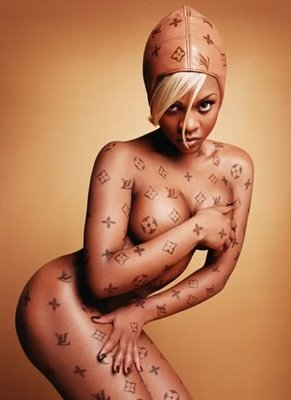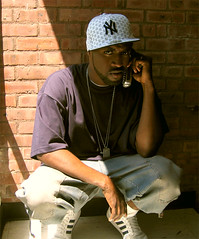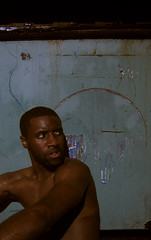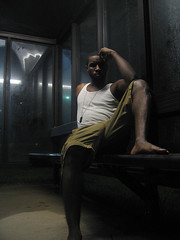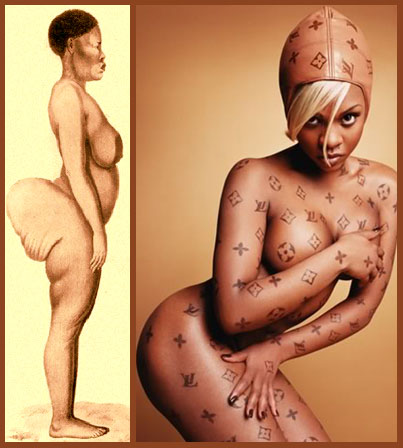Over the last couple of weeks, I've been engaged in a civil, yet empassioned, debate about an article published in the Nation by Daphne Brooks, a colleague of mine here at Princeton. In "
Suga Mamma, Politicized" Brooks first chronicles Beyonce's career as performer, writer, producer and cultural icon, then provides a reading of the "B-Day" album vis-a-vis a number timely political themes.
What does it mean for Beyonce's sophomore solo project to evince such a dramatic shift from the subservient "Cater 2 U" sensibilities she offered on DC3's last album? And how does the class stratification evident in the mis-management of Hurricane Katrina provide us with richer ways to read the sassy, matriarchial (though materialistic) themes of tracks like "Suga Mamma" and Knowles' deployment of bayou imagery in her CD booklet?
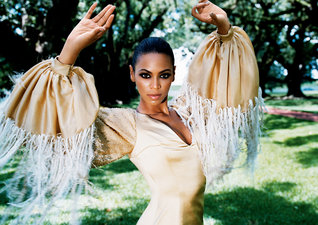
I have my ideas... and I'm exited that Daphne is asking these questions. But some of my colleages believe the article to be much ado about nothing.
Read the article and we'll discuss.
---
Suga Mama, Politicized
Daphne A. Brooks
The video for Beyoncé Knowles's latest single, "Ring the Alarm," shows the stunning 25-year-old singer, dressed in a caramel-colored trench coat that matches her glistening skin, being dragged away by policemen in riot gear and locked in a padded cell. An "alarmed" Beyoncé struggles and writhes, is brought to her knees and pulled by her arms and legs, in a scene that should ring familiar not only to fans of early Sharon Stone spectacles (the clip pays clear homage to Basic Instinct) but to those who still remember Diana Ross and her image-shattering star turn as a drug-busted and jailed Billie Holiday in 1972's Lady Sings the Blues. (Comparisons between Ross and Beyoncé are in abundance now as the latter jettisons her Supremes-inspired vehicle Destiny's Child for a full-fledged solo career and takes on the Ross-inspired lead of Deena Jones in the upcoming film adaptation of Dreamgirls.) The gloss and glitz of this shock-value video may cause casual viewers to write off Beyoncé's newest album, B'Day, as just another collection of sexed-up club jams. But they'd miss out on listening to one of the oddest, most urgent, dissonant and disruptive R&B releases in recent memory.
Much has been made of how the Beyoncé's music of recent years has been a far cry from what pop culture critic David Swerdlick calls the "sistah grrl power" of early Destiny's Child recordings. On those records, and particularly on the multiplatinum The Writing's on the Wall, Knowles and her fellow "children" belted out densely arranged anthems with Waiting to Exhale themes of romantic distrust, material disillusionment and "ne'er do well" scrub boyfriends who were roundly criticized and kicked to the curb. The group's early hits--"Bills, Bills, Bills," "Bug a Boo" and "Independent Women, Part 1" among them--chart the young Texan's rise as a popular black female songwriter. The Beyoncé of old joyously rejected the stalker tendencies of needy men who persisted in "stressin'" her on her "beeper" and feckless freeloaders who "maxed out" her credit cards.
The Beyoncé on B'Day is anything but the "daddy's girl," "naughty but nice" icon who came bounding onto the scene with her first solo effort, 2003's remarkably successful Dangerously in Love. On B'Day, Knowles is unafraid of complicating and disturbing the image that won her fame. On these newer songs, the über-glam urban diva experiments with a startlingly abrasive persona that feels different from most contemporary pop divas (see, for instance, Christina Aguilera's "virgin-whore-virgin" dance, Britney's "virgin-whore-whore" dissolution or even Madonna's "whore"-to-mother moves). Instead of mistaking "edge" (the much-overused term) for raunch as her peers often do, Beyoncé finds different emotional notes to sound: spiritual discontent, romantic pessimism and self-control. Knowles especially stresses the pleasures of hard work as a means to overcoming despair. What's more, she packages her messages in a hard and frantic sonic register that sets this record apart from other MTV divas' pet projects. Quirky and unpredictable from beginning to end, this record hits a range of intriguingly sour notes that defy expectation. This alone seems reason for pop fans to take a second listen to B'Day--and to take note of the way the album shrewdly remixes R&B tales of "Resentment" (the title of the closing track), desperation and aspiration in contemporary black women's popular culture. It comes at a time when public and political voices of black female discontent remain muted and mediated in the public eye, from the scuffle between police and former Congresswoman Cynthia McKinney to the ubiquitous images of Katrina survivors--overwhelmingly black and female, who are spoken for by the media, politicians and corporate interests far more often than they are heard speaking for themselves.
In a genre known for its legion of Svengalis hovering over the talent, Beyoncé repeatedly boasts about doing it all: She is B'Day's singer-songwriter, performer and one of the record's many co-producers. (All the tracks were co-written and co-produced by Beyoncé.) Her publicity team has stressed that she herself conducted and oversaw a compressed recording period and a studio dynamic that heightened its frantic sound. Recorded in two weeks in the wake of the Dreamgirls shoot--allegedly in secrecy from both her manager/father Matthew Knowles and from Columbia Records--B'Day has been repeatedly characterized by the artist herself as a Beyoncé-orchestrated endeavor: "Well, I made the movie and then I went to Miami to start that plan," Knowles told Essence magazine in September. "But when I got there, I had all these songs in my head. So I thought, Let me get into the studio. But it was all a big secret."
Whether you believe it or not, this is a rather unique and remarkable spin story for a female R&B artist's album: Everyone from Mariah Carey to Mary J. Blige to Christina Aguilera has aggressively centered the making of their recordings (and their success) around a producer. Knowles makes use of her own impressive array of production wizards (ranging from old stand-bys the Neptunes to Norwegian hitmakers StarGate), but she has also insisted on her own involvement in directing the multiple roles of her producers--arranging them to work in multiple studios simultaneously so as to reportedly capture the feel of "battling" MCs so prominent in the making of Jay-Z's Roc-A-Fella records. In many ways, the "independent woman" of Destiny's past has morphed on this record into a production Svengali in her own right--and into a woman who, in this behind-the-control-panels role, defies being pigeonholed as mere arm candy.
The power grab begins early, on the first track, "Déjà Vu," in which Beyoncé, as conductor, calls for bass, hi hat and 808 drum machine, and, finally, for Jay. (Online message boards and pop music critics alike expressed shock and disappointment with this lead single--called "flat" by some--but the track wisely uses the pair's notoriety to drum up interest in the album.) But Knowles quickly shifts gears, speeding up the tempo of the record on "Get Me Bodied," a Swizz Beatz-produced dancehall track. Combining Rasta beats with double-dutch syncopations and gorgeous vocal harmonies (by Knowles herself, natch), "Get Me Bodied" celebrates the joys of girls' night out. It's both more percussive than "Déjà Vu" and more resonant with the sounds of black girls' play--ropes twirling, handclapping and improvised cheers--games that, as ethnomusicologist Kyra Gaunt writes, are the backbone of black popular music culture.

The rat-a-tat doesn't let up. B'Day is an album that sounds like a battlefield--or at the very least a race of sorts, in which Beyoncé emerges victorious as a co-producer and entrepreneur engaged in multiple forms of self-reinvention and personal reparations. It might seem strange to credit an artist whose contributions to the culture have so far included readying us for her "jelly" with making a statement on one of the worst American tragedies in recent memory, but B'Day defies the odds by delivering a collection of songs that refract the emotional and material stress of post-Katrina Southern life. The tour of Gulf Coast culture begins with the images in the CD booklet: photos of a hard yet luscious Jet magazine centerfold Knowles--whose family hails from Houston and New Orleans--lifting a leg in a thigh-high juke joint mini on the dock of the bay, navigating twin crocodiles by the leash through verdant wetlands in high heels and a cut-out swimsuit, and walking the path of dusty railroad tracks in a leather and frills bodice. It's not exactly clear what showcasing the singer as sexually titillating against a landscape that resonates with (Eve's?) bayou imagery means (one should be "bootylicious" even when the levee breaks?), but it's clear that the rural American South that the world confronted in new and unsettling ways over the past year is front and center here. That uncanny south, the gothic and chaotic one of our nation's nightmare, provides a fitting backdrop to the controversial video "Déjà Vu," which recycles an historical déjà vu of the creepiest sort--a tricked out plantation setting with Knowles alternately draped across ornate Victorian furniture and dashing haltingly through everglades and (cotton?) fields looking like a deer in headlights or, perhaps more accurately, like a fugitive house slave on the run.
How to get free of this oppressive universe? On the record, Knowles runs headlong into the material world as a site of refuge. And no track sums up the theme of materiality more startlingly than "Suga Mama," a song that returns Beyoncé to her relationship with the (dollar) "bill" and her search for a partner who fits the bill. Promising her baby that she "won't let no bills get behind," Beyoncé effectively assumes the role that her Destiny's Child-era lover of her "Bills, Bills, Bills" days cannot fulfill. If her man of that song from the past can't "pay the automo'bills," then "Suga Mama" suggests she's more than ready to take the reins. Producer Rich (Crazy in Love) Harrison folds a gut-bucket blues guitar lick from J Wade & the Soul Searchers into a back-road beat as Knowles celebrates a nubile lover whose services are worthy of the gift of a "short set." Her (postcoital?) praise celebrates the purchasing power of the singer herself, whose love is seemingly not for sale but who is capable of providing the bling, the "new whip," the "new heavy on the wrist" to satisfy her lover's needs.
Even a seemingly innocuous R&B song like "Suga Mama" has the power to force post-disaster questions related to protection and survival. What, for instance, does it mean to be a "Suga Mama" with an "accountant waiting on the phone"? What does it mean to be a woman who proudly claims to be the "type to take care of mine" in an age of gross federal (read: patriarchal) failure to serve and to protect? In many ways, particularly given the example of Knowles's own mother, clothing designer and salon owner Tina, who has been responsible for most of Destiny's Child as well as Beyoncé's onstage costumes, there is something remarkable, almost parodic, about a track with a sinuous chorus ("Sit on mama lap/Hey, hey/Come sit on mama lap") that insists on the power and the allure of maternal entrepreneurialism.
On the surface, " Upgrade U," a battling MCs track of sorts that again features Jay-Z, is an astoundingly retrograde song, one in which the Beyoncé of Destiny's Child's controversial track "Cater 2 U" re-emerges and offers to "take care" of the home and her man. There is, though, perhaps a bit more to it than its cowboys-on-the-range horns and synthesizer arrangements. Even in a line as ludicrously overblown as "I can do for you what Martin did for the people," Knowles's fixation on material forms of uplift ("Audemars Piguet you/Switch your necktie to purple labels!") steers the track toward the theme of literal and figurative redress that hangs over B'Day. Rather than assuming the role of the helpless dream-girl, Knowles boasts about turning Jay-Z into a good product: "Unless you're flawless/Then ya dynasty ain't complete without a chief like me."
It would be easy to interpret the hit single "Ring the Alarm" as a familiar story of the "woman scorned." There is, after all, the chorus, an abrasive, in-your-face mantra in which Beyoncé yells a how-dare-you-step-out-on-me refrain that's punctuated by red alarm sirens. And its cathartic outrage recalls the kind of carefully marketed breakup ire voiced by the likes of pop songstresses like Alanis Morissette and Kelly Clarkson. But Knowles uses it to more complicated, tough-minded ends. "Ring the Alarm" gives loud, burning-down-the-house voice to a woman who's more concerned with losing her stuff, her "chinchilla coats," the "house off coast," "everything I own," than she is with losing love itself. Relationships and desire, in Beyoncé's cold, class-act world, are, in fact, all about business transactions: "I don't want you but I want it/And I can't let it go/To know you give it to her like you gave it to me, come on..." The "it" that Beyoncé laments losing--sex, money, power--is cause for starting a fire.
Fittingly, B'Day closes on a dissonant note with the song "Resentment," which loops a sample of Curtis Mayfield's melancholic "Think" with gospel and doowop-tinged harmonies to convey the pure depths of romantic bile. With shrill vocals stretched to the very extreme, "Resentment" is a difficult, visceral way to end an album. In its dulcet melody and intricate harmonies, the song recalls the early '70s soul arrangements of En Vogue's 1992 smash cover "Giving Him Something He Can Feel," but Knowles's version of retro-soul re-outfits electric sexual healing and "feeling" as shards of pain. This resentment is rushed, pulsing with emotion that comes from the the crossroads of a choir solo and juke joint nightclub abandon. It's an extraordinarily uncomfortable crescendo, a jagged little pill for fans to swallow and one that reminds us, as Jody Rosen recently pointed out, that this is indeed a "tough record" produced by "a storm system disguised as a singer."
What may be "toughest" about it is the way that it gamely challenges century-old American myths about race, class and gender--ones that still portray black women as lazy, feckless, "degenerate" and unwilling to work, thus encouraging what scholar and critic Hazel Carby has described as the "policing" of black women's bodies. Knowles's album stands as a musical response to black women's social dislocation in the wake of yet another massive migration, and it envisions a language of ownership that is at once perhaps almost liberating and disturbingly materialistic: So many poor and working-class African-American households, especially those headed by women, lost everything in the storm. B'Day expresses the wants and needs of a heroine actively contemplating what it means to lose, and to have, and to possess. While there is no way to get around Knowles's ultra-privilege (her extreme wealth dates back to her childhood, and she has roots that run deep in New Orleans), there is nonetheless something profoundly interesting and unusual about the drama that she sells on B'Day. She is neither the "hard-knock" heroine that Mary J. Blige has steadily cultivated as a persona over the past decade, nor the reigning tragic diva whose crown has been passed between Whitney Houston and Mariah Carey for some years now. On her second solo album, Knowles appears to be fashioning a coarse, hard-nosed character who stands apart from the R&B pack in expressing clear-sighted anger and efficient, pick-up-the-pieces resolve.
An even tougher challenge for fans and critics alike may be to take seriously the political dimensions of a pop music album by a glamorous black female artist when the semi-plagiarized "modern times" of other musicians still entertain the most studied attention of rock scribes. B'Day may not match the poetic commentary of Tracy Chapman or Joan Armatrading, nor does it offer the hard spiritual and sexual candor of Meshell NdegeOcello's finest work or the sheer experimental exuberance of brash newcomer Alice Smith. But it delivers a unique version of black female dissent in pop and R&B music culture. Beyoncé is part of a tradition of black women's musical expressions of personal and political discontent ranging from singers like Nina Simone and Odetta to MCs Lauryn Hill and Jean Grae to the brilliant new artist Keyshia Cole, who has released one of the most brutally visceral, emotionally assertive and convincingly combative R&B records of the decade, The Way It Is. Knowles's album of hard, militarized beats marches in defiance of a long history of public black women, from Sojourner to Superbowl Janet, who have been stripped and stressed and displaced and denied.
about Daphne A. Brooks
Daphne A. Brooks, an associate professor of English and African-American studies at Princeton University, is the author of Bodies in Dissent: Spectacular Performances of Race and Freedom, 1850-1910 (Duke) and Jeff Buckley's Grace (Continuum).
more...
